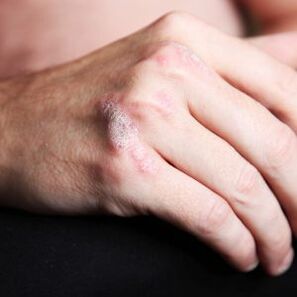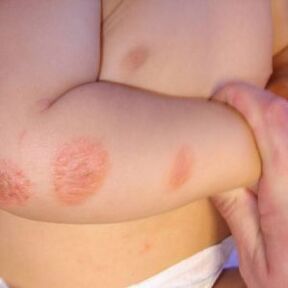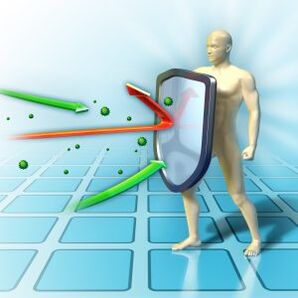
Finding an effective cure for psoriasis would be much easier for scientists if they understood exactly the reasons for its occurrence. The “why? ” Appears not only on the luminaires of science, but also in all patients who are forced to fight this disease. Theories about incentives began to emerge centuries ago. We have dozens of guesses today, but all of them are still waiting for scientific evidence. Studying the possible causes of psoriasis in many patients will help prevent the recurrence of the disease, and healthy people should not face it at all.
Hereditary theory
Dermatology around the world has certainly established one of the causes of psoriasis - a genetic predisposition. Today, 60% of all patients with psoriasis have relatives with the same problem. Such conclusions led scientists to study in more detail the theory of the hereditary origin of the scaly lichen.
On 5 April 2013, the WHO Secretariat prepared a research report in this area. I have successfully installed the following:
- if one parent is a patient in the family, the child’s risk of illness is 14%;
- if both parents are involved in the family, this risk increases to 41%;
- if a nurse or sibling is sick - 6%.
In this case, psoriasis can appear after several generations, "bypassing" the previous ones.
An important task for biochemists has been to find out which gene is responsible for such inheritance. Examination of the patient’s genome identified nine gene loci that may be associated with psoriasis. However, a single gene responsible for the inheritance of the disease has not been identified.
All that is known is that it is not the scaly lichen itself that is inherited, but only the tendency to do so. This means that a person whose relatives have encountered a similar problem does not necessarily suffer from psoriasis. Therefore, it cannot be considered as a purely hereditary disease. In order for psoriasis to manifest, additional pathogens will be needed, which can also be considered as causes.
In addition, the question remains about the remaining 40% of patients - why did they get sick if no one in their family had a similar problem? This task is forcing scientists to further research the causes of scaly lichen.
Infections and viruses as pathogens

The infectious theory of the disease was among the first to be studied, about two centuries ago. Scientists of the 19th century were convinced of the fault of the abnormal microorganisms and diligently tried to determine which of them was responsible for the disease. This explanation seemed to be the most obvious, as psoriasis may appear suddenly in patients and may also enter sudden remission. And today, this idea is supported by scientists.
Proponents of infectious theory believe that pathogens send impulses to autonomic division and the endocrine system, affecting their function. Such changes disrupt the body’s normal ability to respond to and adapt to the environment. As a result, if we add another provocative factor, the skin cells do not die in 30 days (which is natural for them) but in 4-5 days, so a group of keratinized cells appear on the hands, head, face or bodyin the rest. inflammation.
Doctors have been researching fungi and bacteria for many years and trying to find a connection between them to the cause of the disease. But there is no one among the pathological organisms known to medicine that can become a "trigger" for dermatosis. Today, the contagious theory of the appearance of the scaly lichen is not considered major, nor is it completely rejected. There is still some association between psoriasis attacks and infections.
Angina, acute respiratory viral infections, streptococci, tonsillitis, and other infections have been found to often accompany the first outbreaks of scaly lichens and cause relapse in the remission phase. But most doctors tend to believe that infections only trigger the onset of an existing disease.
The theory of the viral nature of the disease was also among the first to emerge. However, this assumption has completely collapsed since medicine found that psoriasis did not spread from person to person. However, there are viruses that persist in the body for years, reduce immunity, and can cause psoriasis if the skin’s immune system is damaged. In practice, blood transfusions occur from a sick person to a healthy person, even though the healthy body is not infected with scaly lichens.
Theory of impaired metabolism
One of the features that doctors noticed during psoriasis was the low temperature of the patients. At first, this was considered a symptom of the disease, but over time, doctors attributed a different meaning to this phenomenon. The fact that a constant decrease in temperature indicates a disturbed metabolism. Blood tests on patients confirmed that patients with psoriasis contain too much cholesterol, both in adults and children.
Blood tests on patients confirmed that patients with psoriasis contain too much cholesterol, both in adults and children.
Such indicators indicate a violation of lipid metabolism in the body. This, in turn, leads to rapid keratinization of skin cells, which is why some scientists consider psoriasis to be cholesterol diathesis. However, it has not yet been determined whether cholesterol rises before or after the first outbreak.
In addition to cholesterol in the patient's body, the balance of minerals and vitamins is also disturbed, and these changes have serious consequences. Vitamin C was found to be unnecessary in patients with scaly lichen, and vitamins B6, B12, A were insufficient. You've also noticed that you have broken content:
- zinc;
- iron;
- copper;
- cobalt.
Displacements of the mineral complex significantly reduce the adaptive and protective functions of the body. That is, scientists believe that metabolic disorders can create an ideal platform for the disease: it can weaken the immune system, shorten the lifespan of skin cells, and so on. In the presence of an irritant (trigger), the disease progresses and the first symptoms appear. What factors may affect this are also considered a little below. Such shifts cause not only inflammation of the body but also psoriasis of the nails.
Such a violation of the balance of useful ingredients is confirmed under laboratory conditions. Therefore, in the treatment of psoriasis, it is dangerous for the patient to even take vitamins on their own. Complex therapy necessarily involves diet, often starvation and a low-calorie diet, as patients ’carbohydrate metabolism is also impaired. Positive developments in such activities partially support harmful metabolism.
But most doctors see such changes as a consequence, not a cause of the disease. Such doubts are based on the fact that a metabolic disorder would initially slowly lead to other symptoms, and psoriasis in most cases appears immediately on the skin.

Hormonal disorder in pathogenesis
Patient statistics show that women are slightly more likely to suffer from psoriasis than men. Moreover, in the weaker sex with such a problem, the symptoms of psoriasis occur primarily during ovulation and menstruation. Such characteristics of the "behavior" of the disease have led scientists to think about the hormonal factor in the development of the disease.
Indeed, when the hormonal background is disrupted, patients often relapse: during pregnancy, menopause, taking hormonal medications, and so on. This hypothesis is supported by general statistics on the first manifestations of the disease. In women, the initial symptoms appear at the age of 15, in men slightly later - 20-25 years. This is due to the fact that hormonal balance occurs later in the stronger sex.
But this theory has also met opponents against scientists. The fact that displacement of the hormonal background today causes outbreaks of dermatosis does not raise any doubts among physicians, however, this is considered to be the cause of the disease. The hypothesis that hormones can cause psoriasis in a healthy person is ruled out, as the first symptoms and relapses of the disease occur in the background of hormonal "calmness. "
Psychosomatics of illness
A World Health Organization study on psoriasis found that 2% of the planet's total population suffers from the disease. However, in developed countries and megapolises the proportion of patients is much higher than in the periphery or backward countries - an average of 4, 6%. They began to examine an unusual tendency, in the hope that we could find the psoriasis. Research on the phenomenon and scientists have concluded that psoriasis may be caused by psychological causes.
The skin is designed to reflect the general condition of the body, all changes in health, including mental instability, are "scanned" through it. Some doctors tend to believe that psoriasis plaques are a way for the body to nervously report the problem. Hence the fluctuation of statistics: life in megacities is more vibrant, with a lot of stress, as opposed to more measurable life in a small town.
Psychologists who are also involved in treating patients are more prone to this theory. It is believed that mental disorders can affect not only the moral but also the organic component, i. e. the body. Thus, various changes in the nervous system can cause indigestion, skin rashes, breathing problems, and changes in heart rate.
These disorders are:
- Suppression of desires. For example, “I want to live with another person / do another job / hit my boss / move”. Suppression of such desires leads to adrenaline being deposited in the body and gradually destroying the organs and their functions.
- Stress, neuroses, depression. Such changes are the same as metabolic disorders, hormonal disorders, and so on. They can become causes
- Guilt, feeling of unfulfilled duty.
- Lack of self-confidence.
- Dissatisfaction with your own body.
- Constant feeling of fear, anger, or other strong emotions.

Sedative treatment and psychological training provide noticeable positive results in patients, which works in addition to the psychosomatic nature of psoriasis. Even doubts about babies (where do they get psoriasis from then? ) Are explained by psychologists. Newborns are known to be able to feel and respond to the condition and well-being of the mother. So in the case of maternal problems, the baby can go through various changes, from pathologies.
Child care is also considered a factor in the development of scaly lichens in children. For example, in the absence of maternal love, the child experiences the same strong emotions as an adult (pain, fear, anger). The body, in turn, tries to report the defects, and papules and plaques appear on the skin.
Excessive parental care can have such consequences, but this is especially the case in families with children over 4 years of age. The established personality tries to gain more freedom, and the parent, on the contrary, tries to tie the child to himself. The resulting conflict affects the child’s sensitive body in the form of an inflamed rash.
Today, this theory of the causes of psoriasis is considered one of the main ones, in addition to immunology. Scaly lichen therapy charmingly includes self-improvement, exclusion of negative thoughts and stress, and a state of rest. The treatment even requires meditation and yoga classes, travel, hobbies that help the patient no less than medication. However, the course and development of the disease suggest that the psychological factor is by no means the only one.
Hypothesis for impaired immunity

Research in the genetic theory of the origins of psoriasis has shown that all patients have decreased cellular immunity. This trait is also inherited, but can also arise as a result of gene mutations. According to scientists, in case of a congenital or acquired tendency, the damaged skin may be subjected to autoimmune aggression. That is, the body perceives the affected skin cells as hostile and attacks them.
This hypothesis was supported by examination of patients' blood and balance above plaques. It has been found that there are indeed antigenic complexes in keratinized cells, and these complexes contain antibodies in the blood. In healthy people, this is not observed in either the blood or the dermis.
Such analyzes suggest that immune disorders play an important role in the development of the first foci of psoriasis. In view of this fact, antihistamines are used in complex drug therapy to reduce the aggression of the immune system against their own cells. However, there are still a number of factors that influence the course and relapse of the disease, although not related to immunology, so none of the theories considered would be unanimously accepted.
Causes of preventable relapse
The search for the root cause of the disease has led to the emergence of a mass of theories and hypotheses awaiting their scientific substantiation. Although we have not been able to find a single cause, we have an extensive list of factors that cause relapse.
The first of these factors is stress, a negative displacement of the nervous system at the onset of the disease that has become a trigger and provokes outbreaks of pre-existing psoriasis. Given this fact, doctors recommend that their patients avoid stressful situations whenever possible.
Patients present an active lifestyle, sports, travel.
In about 14% of patients, scaly lichen begins at the site of trauma and skin damage, which is possible if a person is already prone to psoriasis. Scratches, scratched bites, or rashes can be the location of papules and plaques. Patients should carefully monitor the condition and cleanliness of the dermis, treat the wound site with hydrogen peroxide, and apply bandages or patches.
Regular moisturizers are also recommended for body and scalp care as dry skin is more likely to fall back. It is necessary to leave the scrubs and peeling, hard washcloths so as not to injure the skin again. You need to hydrate your body with hypoallergenic creams, baby ointments or oils. For the first signs of a rash, you should not rely on opinions and photos on the Internet to "diagnose" the diagnosis on your own. It only takes valuable time to turn to a better professional.
Medications (both tablets and ointments) should be monitored by a doctor, especially with regard to antibiotics and immunomodulators. Even additional vitamins can trigger the progression of the disease, especially vitamins C, A, B. If you have an infection or fungus, be sure to see a doctor and do not self-medicate. It is important that viral illnesses do not get chronic and do not delay seeing a doctor.
Proper nutrition is essential. Patients are prescribed a diet that strengthens the body and reduces the risk of relapse. For each patient, this is a unique nutritional system based on the stage of the disease, the level of immunity, and the presence of concomitant diseases. It is important not to violate the rules of the prescribed diet, avoid fast food, allergenic foods (honey, nuts, chocolate, citrus fruits, red foods, etc. ).
Thus, the patient must maintain a completely healthy lifestyle: exercise, monitor nutrition, and strengthen moral health. This includes the mandatory refusal of alcohol, as even small doses can provoke an outbreak of the disease. These principles serve to prevent not only psoriasis but also many other diseases.























